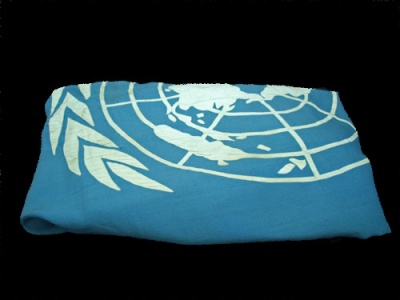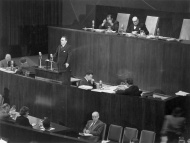Events In History
-
 24 July 2000New Zealand soldier killed in Timor-Leste
24 July 2000New Zealand soldier killed in Timor-LestePrivate Leonard Manning was the first New Zealander killed in combat since the Vietnam War. Manning's patrol was part of New Zealand's contribution to a United Nations peacekeeping force in the fledgling nation of Timor-Leste (East Timor). Read more...
-
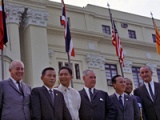 8 September 1954NZ signs Manila Pact
8 September 1954NZ signs Manila PactThe South-East Asia Collective Defence Treaty, or Manila Pact, aimed to contain the spread of communism in the region. The South-East Asia Treaty Organisation (SEATO) was the institutional expression of this treaty. Read more...
Articles
NZ's Search for Security
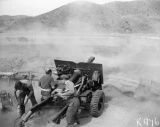
Overview, links to related topics and suggested classroom activities for this potential NCEA topic
-
Page 2 – Overview
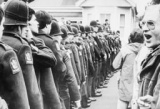
Background information for the NCEA Level 1 history theme New Zealand's Search for Security
-
Page 3 – Related topics
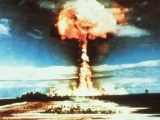
Links to topics relating to the Level 1 NCEA theme New Zealand's Search for Security
Human Rights Day

On 10 December 1948 – Human Rights Day – the United Nations General Assembly adopted the Universal Declaration of Human Rights. This declaration set out 30 articles or statements about human rights and freedoms. The Classroom includes a range of activities to support the teaching of this subject.
- Page 1 - What are human rights?On 10 December 1948 – Human Rights Day – the United Nations General Assembly adopted the Universal Declaration of Human Rights. This declaration set out 30 articles or
New Zealand and the United Nations

New Zealand has a tradition of commitment to the concept of collective security. It was a member of the League of Nations between the world wars and was active in the establishment of the United Nations in June 1945.
-
Page 3 – Participation in the United Nations
The United Nations Charter established six principal organs to achieve its aims. New Zealand has played a part in all of these organs.
-
Page 4 – Universal Declaration of Human Rights
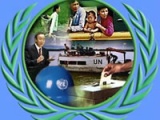
In 1950 the United Nations General Assembly passed a resolution to adopt 10 December as Human Rights Day. New Zealand has participated actively in human rights deliberations at
-
Page 5 – Further information
Find out more about New Zealand and the United Nations.
1981 Springbok tour

For 56 days in July, August and September 1981, New Zealanders were divided against each other in the largest civil disturbance seen since the 1951 waterfront dispute. The cause of this was the visit of the South African rugby team – the Springboks.
- Page 3 - Politics and sportSouth Africa's apartheid policies and attitudes created obvious problems for New Zealand rugby, given the prominence of Māori in the
The Cold War

Although the origins of the so-called Cold War can be traced back to the Bolshevik revolution of 1917, this intense ideological struggle between the Western powers and the Soviet Union really began after the Second World War.
-
Page 4 – Treaties and alliances
During the 1940s and 1950s New Zealand signed a series of collective treaties with Britain and the United States aimed at countering the threats of Japanese military resurgence
New Zealand in Samoa

New Zealand was ill-equipped to cope with the Western Samoa mandate allocated by the League of Nations in 1920. The Mau movement's passive resistance culminated in the violence of 'Black Saturday', 28 December 1929, which left 11 Samoans and one New Zealand policeman dead.
- Page 8 - Towards independenceOn 4 June 2002 Prime Minister Helen Clark offered 'a formal apology to the people of Samoa for the injustices arising from New Zealand's administration of Samoa in its earlier
Biographies
-
 Fraser, Peter
Fraser, Peter
Peter Fraser, New Zealand’s wartime PM, led the nation for nine years. Respected rather than loved like Savage, many experts rate him our finest PM.
Read more... -
 Clark, Helen Elizabeth
Clark, Helen Elizabeth
Jenny Shipley may have been our first female PM, but Helen Clark was the first elected one. In 2008 she became our fifth longest-serving PM and Labour’s first to win three consecutive elections.
Read more...
Related keywords
- SEATO
- international relations
- cold war
- korean war
- peter fraser
- samoa
- soviet union
- royal new zealand air force
- communism
- united states
- human rights
- anzus
- malayan emergency
- vietnam war
- mau movement
- labour party
- olaf nelson
- helen clark
- pacific islanders
- flags
- 1950s
- MPs
- prime ministers
- WW2
- conscientious objection
- trade unions
- women in politics
- national identity
- carl berendsen
- nuclear free
- springboks
- protest
- rugby
- sport
- maori sport
- south africa
- racism
- george nepia
-
Main image: United Nations flag
United Nations flag presented to Signalman Arthur Lyall Philip, Royal New Zealand Corps of Signals at the Inchon Rest Centre, South Korea on 9 July 1952.

